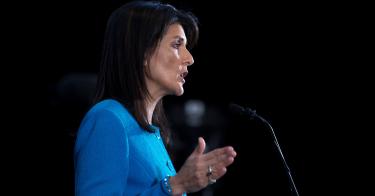The United Nations General Assembly recently approved a two-year budget of $5.397 billion. U.S. Ambassador to the U.N. Nikki Haley lauded this outcome, which was $285 million less than the previous budget—a 5 percent cut.
The fact is, however, that Amb. Haley has a lot more work to do.
In dollar terms, the budget cut she secured, if maintained, will save U.S. taxpayers over $31 million in 2018 and again in 2019-- but the U.S. will still pay $594 million each year.
That sounds like a lot and it is. But it’s just the tip of the iceberg.
American taxpayers provide billions of dollars each year to over 100 international organizations. All told, according to the U.N.’s top-level Chief Executives Board, the U.S. contributed over $9.7 billion to the U.N. system in 2016 alone.
The next largest contributor, Germany, paid a third of that amount. Meanwhile, some of the least assessed countries pay a pittance – less than a million dollars per year to the entire U.N. system.
Looking just at the U.N. regular budget, where the U.S. pays 22 percent of the total, we find that a number of countries will pay less than $27,000 each. All told, the U.S. will pay more than 178 other countries combined.
This explains why the U.S. pays more attention to accountability, oversight, and budgetary restraint in the UN and other international organizations than other governments do. We care more, because we have more skin in the game.
And it’s your skin. As noted years ago by Joseph Torsella, President Obama’s former U.S. Representative for U.N. Management and Reform, “Every dollar sent to the U.N. represents the hard work of a taxpayer somewhere, and any dollar wasted at the U.N. is a wasted opportunity to build a better, freer, and more prosperous world.”
This is a supremely difficult task. Even tracking what the U.N. does is no easy matter. In 2005, the General Assembly ordered creation of a database listing the number of tasks or “mandates” that the UN membership had ordered up. There were more than 9,000—well beyond anybody’s best guess.
Many of them dated back decades. An analysis to see how many of them remained “current and relevant” concluded that over a third were not. But rather than eliminate these pointless activities, the General Assembly decided to terminate the mandate reviewprocess and shutter the database. Other UN oversight mechanisms have likewise been eliminated for being too effective and thorough at uncovering mismanagement and malfeasance.
Multiple U.S. administrations have pushed for better stewardship. They have tried to get the organization to lower U.S. assessments, require consensus to approve the U.N. budget, adhere to zero-growth budgeting, and adopt other measures to constrain budget growth and ensure resources are not squandered.
Despite all that, the U.N. regular budget has doubled over the past 16 years, from $2.7 billion for 2002 and 2003. This growth has occurred even with strong, bipartisan U.S. efforts to constrain it.
For example, in 2012 the Obama administration announced “the first U.N. regular budget since 1998 – and only the second in the last 50 years – that has gone down in comparison to the previous budget’s actual expense.”
The “final” 2012 budget number, however, ended up more than $150 million higher as new mandates and activities were added after the initial budget was approved. As illustrated in the chart, these mid-budget increases are a recurrent pattern.
If Amb. Haley wants to preserve her achievement, she must remain wary of similar creeping increases in the coming months. And she’ll need to identify future savings and efficiencies to free up resources for unforeseen priorities that will inevitably arise. Some suggestions:
- Try to revive the mandate review to identify outdated, duplicative, or irrelevant activities. That would free up resources to fund new or intensifying priorities.
- Target U.N. personnel costs. These have consumed between 65 percent and 68 percentof total expenditures in the past five UN regular budgets. Most of the touted 5 percent reduction in the 2018-2019 budget came from cuts to travel, contractual services, furniture and supplies, contracted experts, and information technology. A thorough review and reform effort cannot ignore two thirds of the budget. The U.S. should seek to reduce excessive compensation for UN employees whose pay scale surpasses that of equivalent U.S. civil servants.
- Use contractors and outsource tasks where possible. For instance, the U.N. operates in six official languages, meaning that official documents– more than 450,000 pages each year—must be translated. Estimated cost: over $1,200 per page. There is no need in most cases for this to be done by U.N. employees or in high cost locations like New York and Geneva.
- Pay close attention to big-ticket budget items. For instance, the regular budget includes roughly $500 million for five regional economic commissions to “promote economic integration and policy dialogue.” The U.S. share of that is about $110 million. Are they necessary? It is unlikely that Europe needs the UN Economic Commission for Europe to encourage regional integration. Moreover, the commissions largely focus on issues already covered by the World Bank, IMF, or other parts of the UN system.
Unfortunately, U.S. Secretary-General Antonio Guterres has called for the regional commissions to be “strengthened,” despite their dubious merit. The U.S. should insist that, if the regional commissions continue, they be funded through voluntary contributions rather than mandatory assessments. After all, if they provide value, the governments affected should be eager to support them.
Ambassador Haley deserves recognition for cutting the U.N. regular budget and for her commitment to U.N. reform. However, a more efficient and effective U.N. will not be achieved in the first-phase budget for 2018-2019.
Her greater achievement will need to be what happens in future months.
This piece originally appeared in Fox News



